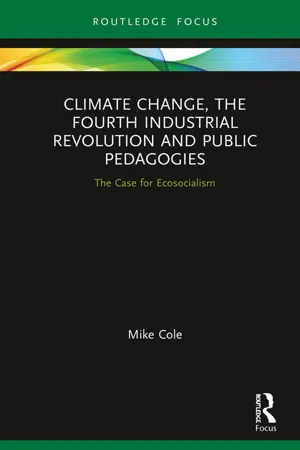
Climate Change, The Fourth Industrial Revolution and Public Pedagogies
The Case for Ecosocialism
- 112 pages
- English
- ePUB (mobile friendly)
- Available on iOS & Android
Climate Change, The Fourth Industrial Revolution and Public Pedagogies
The Case for Ecosocialism
About This Book
Climate Change, The Fourth Industrial Revolution and Public Pedagogies: The Case for Ecosocialism uses public pedagogy as a theoretical lens to examine climate change emergency and presents a solution to the issue in ecosocialism.
The book addresses the climate's relationship with capitalism and the role of activism in highlighting the climate change emergency. With respect to the Fourth Industrial Revolution, Cole assesses the pro-capitalist arguments that this revolution can be considered a progressive force and critiques them from a Marxist perspective. A case is made for ecosocialism, a form of socialism that is informed by feminism, inclusivity and real democracy. Ecosocialism, it is argued, can address climate change destruction and harness the potential fruits of the Fourth Industrial Revolution for the good of all. The book ends by addressing the other great threat to civilisation alongside climate change, with a postscript providing some final words of warning about the dual perils of climate change and nuclear warfare.
This highly topical book will be of interest to scholars, postgraduate students and researchers, as well as to advanced undergraduate students in the fields of environmental studies, pedagogy, and sociology. It will also appeal to all readers who are concerned with the onward march of climate change destruction.
Frequently asked questions
Information
1
Capitalism and planetary destruction
Introduction
1.1 Capitalism and planetary destruction
The Paris climate change accord
- Keep global temperatures ‘well below’ 2C above pre-industrial levels and ‘endeavour to limit’ them to 1.5C
- At some point between 2050 and 2100, limit greenhouse gases emitted by human activity to the same levels that trees, soil and oceans can absorb naturally
- Review each country’s contribution to cutting emissions every five years
- Enable rich countries to help poorer ones by providing ‘climate finance’ to adapt to climate change and switch to renewable energy
The negative role of certain capitalist world leaders
Trump
Bolsonaro
Table of contents
- Cover
- Half Title
- Title Page
- Copyright Page
- Contents
- Acknowledgements
- Introduction
- 1 Capitalism and planetary destruction: activism for climate change emergency
- 2 The Fourth Industrial Revolution (4IR): capitalist defence and Marxist critique
- 3 Saving the planet and harnessing technology for the good of all: the case for ecosocialism
- Postscript: one hundred seconds to midnight
- References
- Index